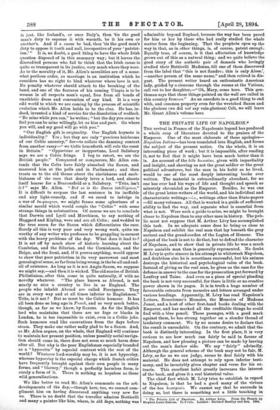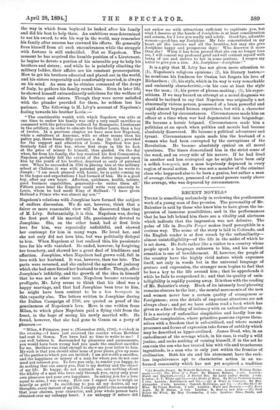THE PRIVATE LIFE OF NAPOLEON.*
THE revival in France of the Napoleonic legend has produced a whole crop of literature devoted to the praises of the Emperor. One of the most elaborate of these apologies— Napoleon Intime—has been translated into English, and forms the subject of the present notice. On the whole, it is an interesting piece of work ; but it is impossible, after reading it, not to feel that it might have been much better than it is. An account of the bête humaine, given with impartiality and insight, and showing us not the great soldier or the great political adventurer, but the man in his habit as he lived, would be one of the most deeply interesting books ever written. The material is extraordinarily abundant, for no one has ever had his ways of life and thought and speech so minutely chronicled as the Emperor. Besides, he was one of the great letter-writers of the world, and his individual and characteristic writings—i.e., writings other than State-papers —fill many volumes. All that is wanted is a guide of sufficient ability to find the way, and separate what is essential from what is not. Were such a guide to arise, we might be brought closer to Napoleon than to any other man in history. The pub- lic must not suppose that M. Arthur Levy has accomplished this task. In no adequate sense does he bring us close to Napoleon and exhibit the real man that lay beneath the grey surtout and the grand-cordon of the Legion of Honour. The object of the book is not to do that, but to defend the character of Napoleon, and to show that in private life he was a much more amiable man than is generally represented. No doubt M. Levy is quite sincere in his attempt to whitewash Napoleon, and doubtless also he is sometimes successful, but his animus destroys the historical and psychological value of the book. Instead of giving us the real man, he gives us the case for the defence in answer to the case for the prosecution put forward by Lanfrey and Taine. And even as a piece of special pleading the book is not very successful, for there is little or no creative power shown in its pages. It is in truth a huge number of favourable extracts from memoirs and letters arranged under various headings. Apparently, M. Levy has read Napoleon's Letters, Bourrienne's Memoirs, the Memoirs of Madame Junot, and a host of other first-hand books dealing with the Emperor, and has marked all the creditable things he could find with a blue pencil. These passages, with a good mark against them, he has strung together on a slender thread of laudatory comment. We by no means desire to declare that the result is unreadable. On the contrary, we admit that the book is distinctly interesting. In the first place, it is very curious to see how much can fairly be said in favour of Napoleon, and how pleasing a picture can be made by leaving out the man's darker side. We say " fairly" advisedly. Although the general scheme of the book may not be fair, M. Levy, as far as we can judge, seems to deal fairly with his material. He does not attempt to rely upon inferior testi- mony, and he invariably gives chapter and verse for his ex- tracts. This excellent habit greatly increases the interest of the book, and gives it a real historical value. The chief fact which M. Levy tries to establish in regard to Napoleon, is that he had a good many of the virtues of the bon bourgeois. We cannot say that he succeeds in doing so, but there is something not a little touching in • The Private Life of Napoleon. By Arthur Levy. From the French by Stephen Louis Simeon. In 2 vols. London Richard Bentley and Bon. 1884
the way in which from boyhood he looked after his family and did his best to help them. An ambitions man determined to use his sword, to win his way in the world, may remember his family after success has crowned his efforts. He generally frees himself from all such encumbrances while the struggle with fortune is still undecided. Not so Napoleon. The moment he has acquired the humble position of a Lieutenant, he begins to devote a portion of his miserable pay to help his brothers and sisters ; and while he is painfully climbing the military ladder, their affairs are his constant preoccupation. How to get his brothers educated and placed out in the world, and his sisters respectably and comfortably married, is always on his mind. As soon as he obtains command of the Army of Italy, he gathers his family round him. Even in later life, he showed himself extraordinarily solicitous for the welfare of his brothers and sisters. Though they were never satisfied with the plunder provided for them, he seldom lost his patience. The following is M. Levy's account of Napoleon's feeling towards his brother Louis :-
" The considerable wealth with which Napoleon was able at one time to endow his family was only a very small sacrifice as compared with the privations endured by Bonaparte, Lieutenant in the artillery, in order to educate his brother Louis, then a boy of twelve. In a previous chapter we have seen how Napoleon, while a subaltern at Auxonne, with no other means than his paltry pay, three francs fifty centimes a day [2s. M.], provided for the support and education of Louis. Napoleon was par- ticularly fond of this boy, whose first steps in life he had, at the price of misery to himself, thus guided. On the day when, far from his family, the boy received his first Communion, Napoleon probably felt the extent of the duties imposed upon him by the youth of his brother, deprived so early of paternal care. When he succeeded in 1795 in placing him at the military school at Chillons, it was with paternal pride that he wrote to Joseph : am much pleased with Louis; he is quite coining up to the hopes and expectations I had formed of him. He is a good boy, after my own heart. Affection, quickness, health, talents, good business capabilities, generosity—he unites them all.' Fifteen years later the Emperor could write very sincerely to Louis, whom he had made King of Holland : 'I have given Holland a Prince who was almost my son.' "
Napoleon's relations with Josephine have formed the subject of endless discussion. We do not, however, think that a fairer or more reasonable view will be discovered than that of M. Levy. Substantially, it is this. Napoleon was, during the first part of his married life, passionately devoted to Josephine. She, on the other hand, had at first little love for him, was repeatedly unfaithful, and showed
her contempt for him in many ways. He loved her, and she not only did not love him, but was politically disloyal to him. When Napoleon at last realised this, his passionate love for his wife vanished. He ended, however, by forgiving her treachery, and showed her a great deal of kindliness and affection. Josephine, when Napoleon had grown cold, fell in love with her husband. It was, however, then too late. The parts were reversed, and she endured the agonies of jealousy which she had once forced her husband to suffer. Though, after Josephine's infidelity, and the growth of the idea in himself that he was not as other men, Napoleon became extremely
profligate, Mr. Levy seems to think that his ideal was a happy marriage, and that had Josephine been true to him,
he might have been content to be a bon bourgeois in this capacity also. The letters written to Josephine during the Italian Campaign of 1796, are quoted as proof of the genuineness of Napoleon's love. Here is one written from Milan, to which place Napoleon paid a flying visit from the front, in the hope of seeing his newly married wife. He
found, however, that she had gone to Genoa on a party of pleasure :—
" Milan, 8 Frimaire, year v. (November 28th, 1796), 8 o'clock in the evening.—I have just received the courier whom Berthier had sent to Genoa. You have had no time to write to me ? I can well believe it. Surrounded by pleasures and amusements, you would have been wrong had you made the smallest sacrifice for me. Berthier was kind enough to shcw me your letter to him. My wish is that you should alter none of your plans, give up none of the parties to which you are invited ; I am not worth a sacrifice, and the happiness or misery of a man for whom you do not care need not interest you. To love you only, to render you happy, to do nothing that can annoy you, that is my destiny and the object of my life. Be happy, do not reproach me, care nothing about the fidelity of a man who lives only through you, enjoy only your own pleasures and your own happiness. In asking you for a love equal to mine, I was wrong. How can I expect lace to weigh as heavily as gold? In sacrificing to you all my desires, all my thoughts, every instant of my life, I simply yield to the ascendancy that your charms, your character, and your whole person have obtained over my unhappy heart. I am unhappy if nature did not endow me with attractions sufficient to captivate you, but what I deserve at the hands of Josephine is at least consideration and esteem, for I love you madly and solely. Good-bye, adorable woman—good-bye, my Josephine. My fate concentrated in my heart all the sorrows and all the troubles, but may she give Josephine happy and prosperous days ! Who deserves it more than she ? When it has been proved that she can no longer love me, I will conceal my profound grief and will content myself with being of use and service to her in some matters. I reopen my letter to give you a kiss. Ah, Josephine—Josephine ! "
It is a pity that M. Levy has not given more attention to (1), Napoleon's religious opinions ; (2), his literary tastes,— he mentions his fondness for Ossian but forgets his love of Richardson ; (3), his style, which in its way is very remarkable and eminently characteristic,—in his case at least the style was the man ; (4), his power of phrase-making ; (5), his super-
stitions. If we may hazard an attempt at a moral diagnosis we should be inclined to say that Napoleon was originally a not abnormally vicious person, possessed of a brain powerful and rapid almost beyond human experience, but with a character easily altered by circumstances. Circumstances made him an officer at a time when war had degenerated into brigandage.
He became a heroic brigand. Circumstances made him a politician at an epoch when politics and morals had become absolutely dissevered. He became a political adventurer and tyrant. Circumstances again made him the husband of a woman who had been corrupted by the corruptions of the
Revolution. He became absolutely cynical on all moral questions. The times demoralised him in the strict sense of
the word, and on every side of his nature. If he had lived in another and less corrupted age he might have been only
a selfish bourgeois, not a man hopelessly depraved in every
region of moral action. He was not a member of the criminal class who happened also to be born a genius, but rather a man of average character, possessed of mental powers vastly above the average, who was depraved by circumstances.



















































 Previous page
Previous page